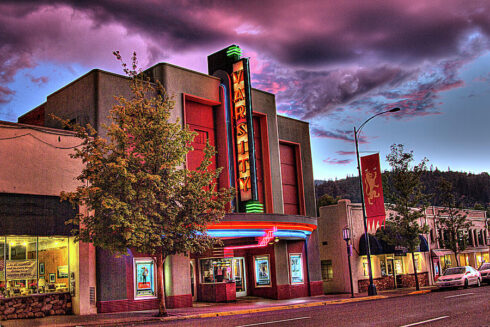On Dec. 17, 2010, Mohamed Bouazizi, a 26-year-old Tunisian street vendor, was being slapped around by the local authorities, and had his fruit cart confiscated by a municipal inspector. He walked a few blocks to the nearby municipal building in an attempt to retrieve his cart, only to be beaten again. Demoralized, he then walked to the governor’s house, sat down in the street, doused himself with paint thinner and set himself on fire.
That single fire and death in a small Tunisian town ignited a movement that is now known as the Arab Spring.
“[The Arab Spring] is something that caught everybody [who studies the Middle East and North Africa] very much by surprise,” said Southern Oregon University Professor Robert Harrison during a lecture on Monday in the Meese Conference Room of the Hannon Library. “It has really caught the imagination of many, many people.”
As part of SOU’s Distinguished Lecture Series, Harrison, who has a doctorate in history and studied in Egypt as a Fulbright scholar, spent much of his lecture not on the Arab Spring itself but on the long and troubled history that the Arab world has faced over the past thousand years.
The “Golden Age” of Islam
During the “Golden Age of Islam,” from A.D. 622 to the Crusades in the beginning of the twelfth century, two successive Islamic dynasties spread the new religion and became an empire that stretched from the Arabian Peninsula to Spain, the professor said. The second of the dynasties had “new aspirations of no longer just conquest but of the spread of Islam the state and the spread of Islam the religion through trade and through intermarriage,” he added.
“Throughout this period, the Islamic state was largely funded through not just the booty it collected from conquest but through vast amounts of trade coming from India, coming from China [and] trade coming from Africa,” Harrison said. “This is how the Arab Middle East, even before Islam, had functioned financially; they were the middle men in the trade between the east and west and north and south.”
But in the year A.D. 1100 things went wrong for the region.
“We have here the beginnings of what I would call the thousand year train wreck of the Middle East,” Harrison said, adding that the train wreck runs all the way into the present period.
If the United States “had taken the beating that the Middle East had taken for close to a thousand years, we would not be in that good of shape either,” he said, offering the statement in opposition to the many pundits and people who argue that the Middle East cannot manage itself.
Harrison lectured about the devastating effects that the Crusades, a “two-way jihad,” had on the region. And noted that, while Christian Europeans were invading from the west, the Seljuk Turks invaded from the north, through the Caucasus.
As if the two separate invasions on two different fronts were not enough, a third — “a political tsunami, a military tsunami” — came in A.D. 1220: “The coming of the first Mongol invasions.”
First under Genghis Khan, and then under Kublai Khan, the Mongols invaded and “conquered the entire Middle East; they destroyed the city of Baghdad … and the area became an abysmal backwater area for trade, for commerce — totally disconnected from its past,” Harrison said.
Most of the the Arab Middle East was “under Mongol tyranny that continued for centuries,” Harrison said.
In the background of these invasions and occupations, Harrison went on to say, the “Silk Road, as it had been known, ceased to bring great caravans from east to west, [and was] no longer under Muslim domination.”
“Seaborne Europeans [had] taken charge of the trade and the trade [was] by ocean,” he added. Ninety percent of global trade was now carried out by Europeans, putting further strains on the region.
“Then came the Ottoman Turks,” Harrison said.
During the 400-year Ottoman rule of the Middle East, Arabs became “second, if not third, class citizens,” he said. “Their language was not recognized, their culture was not recognized.”
A new era
The next major shift, Harrison said, came during World War I. In a series of promises, Harrison explained, the British promised to give Arabs a large Arab state if they took up arms against the Ottomans, an enemy of both the British and Arabs.
“This was a wonderful opportunity [for the Arabs] to break free of Ottoman control,” Harrison said. “But two other things happened.”
The British signed other agreements that offered parts of the land to the French and parts of it to the Jewish people. During the interwar years, the years between the two World Wars, many “collisions” took place between these opposing fractions, Harrison explained, carving up the land piecemeal.
“Following World War II, we have the emergence of a number of parties that have ruled [the Middle East] up until recently,” Harrison said. “For the most part, these parties come from the ranks of the military that ousted the French or the British or the Italians at the end of the Second World War,” he continued.
“[The political parties] were the ones who got rid of the colonial powers so the people had respect for them,” he said, adding, “But that respect dies out after 3 to 4 generations, and you’re getting nothing for your buck, nothing is being done for you, nothing is being done for your population — everything is being done for the ruling party.”
Change is in the air
That respect has died out. “[And now] the Arab Spring is going to produce some kind of democracy; we know that,” Harrison said.
“Think about the American Revolution, think about the French Revolution, think how long it took [for functioning, full democracies to form],” Harrison said, calling for the West to have patience with the Arab world during this uncertain and difficult time.
“This thing, however, is not going to stop, because once it takes root — it’s slowly taking root in Libya, it has taken root in Tunisia — it’s not going to stop,” the professor said. “People want a degree of popular sovereignty,” he added.
In the fourteen months since Bouazizi set himself on fire, sparking the popular uprisings that coalesced into the Arab Spring, three deeply entrenched dictators have been ousted and more are likely to fall in the coming months and years.
“[The Middle East] is growing up; it’s slowly becoming mature,” Harrison said, adding that “these are countries that have long roots in civilization … that reach back 6,000 years.”
“The Middle East is really the deep root of western civilization,” Harrison said.


